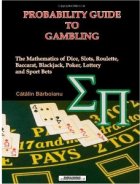 Probability Guide to Gambling: The Mathematics of
Dice, Slots, Roulette, Baccarat, Blackjack, Poker, Lottery and Sport
Bets Probability Guide to Gambling: The Mathematics of
Dice, Slots, Roulette, Baccarat, Blackjack, Poker, Lottery and Sport
Bets
by Catalin Barboianu
This is probably the most useful book from Barboianu's serial of
gambling maths. And is far superior than Packel's or even Thorpe's book, whose
approach is mostly statistical. Gamblers may easily skip the maths sections and
go directly to the odds table they need, due to a professional organization of
the content.
The book contains much new and original material that has
not been published previously and provides great coverage of probabilities for
the following games of chance: Dice, Slots, Roulette, Baccarat, Blackjack, Five
Card Draw Poker, Texas Hold'em Poker, Lottery and Sport Bets.
It begins
by explaining in simple terms the meaning of the concept of probability for the
layman and goes on to become an enlightening journey through the mathematics of
chance, randomness and risk. It then continues with the basics of discrete
probability (definitions, properties, theorems and calculus formulas),
combinatorics and counting arguments for those interested in the supporting
mathematics.
These mathematic sections may be skipped by readers who do
not have a background in mathematics; these readers can skip directly to the
"Guide to Numerical Results" to pick the odds and recommendations they need for
the desired gaming situation.
 Paperback - 332 pages - Infarom (26 Aug
2006) £19.00
Paperback - 332 pages - Infarom (26 Aug
2006) £19.00
No Kindle
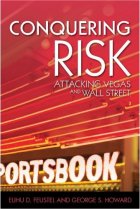 Conquering Risk - Attacking
Vegas and Wall Street Conquering Risk - Attacking
Vegas and Wall Street
by Elihu D. Feustel
How do you win at sports betting? Hard work and lots
of modeling. This book walks you step by step through four winning computer
models in NFL, WNBA, MLB and NCAA Football.
All manners of gambling are
becoming increasingly popular in our society. Whether a person places a bet on
sports or gambles on a stock, he is making a decision on risk. Most people need
much more information than they have to make good decisions on either. A
majority of the book focuses on sports betting. Four in-depth winning models
are demonstrated for MLB, NFL, NCAA Football and WNBA. In addition to methods
for handicapping these sports, there are explanations of a variety of
approaches to exploit sports market inefficiencies and incorrect assumptions of
bookmakers. The approaches to stock betting challenges commonly accepted
knowledge.
How important is diversification? Are investors in individual
stocks just gambling? Is maximizing your portfolio growth worth taking on added
volatility? Is sports betting a better investment than stocks for some people?
The approaches offered to risk taking, especially sports betting are ground
breaking, with more fresh ideas than ever seen in a single coherent
publication.
To elaborate, this is a book that is more of a guide to
thinking about gambling in an advanced sense as opposed to a cookbook detailing
recipes of how to do various bets. Finally a sports gambling book worth
reading.
 Paperback - 288 pages -
George S. Howard (August 16, 2010) £17.67 Paperback - 288 pages -
George S. Howard (August 16, 2010) £17.67
Kindle - 229 pages - Amazon
Media EU S.à r.l. £7.80
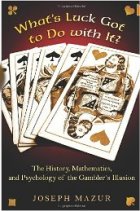 What's Luck Got to
Do with It?: The History, Mathematics, and Psychology of the Gambler's
Illusion What's Luck Got to
Do with It?: The History, Mathematics, and Psychology of the Gambler's
Illusion
by Joseph Mazur
Why do so many gamblers risk it all when they know the odds of
winning are against them? Why do they believe dice are "hot" in a winning
streak? Why do we expect heads on a coin toss after several flips have turned
up tails? What's Luck Got to Do with It? takes a lively and eye-opening look at
the mathematics, history, and psychology of gambling to reveal the most widely
held misconceptions about luck. It exposes the hazards of feeling lucky, and
uses the mathematics of predictable outcomes to show when our chances of
winning are actually good.
Mathematician Joseph Mazur traces the
history of gambling from the earliest known archaeological evidence of dice
playing among Neolithic peoples to the first systematic mathematical studies of
games of chance during the Renaissance, from government-administered lotteries
to the glittering seductions of grand casinos, and on to the global economic
crisis brought on by financiers' trillion-dollar bets. Using plenty of engaging
anecdotes, Mazur explains the mathematics behind gambling--including the laws
of probability, statistics, betting against expectations, and the law of large
numbers--and describes the psychological and emotional factors that entice
people to put their faith in winning that ever-elusive jackpot despite its
mathematical improbability.
This book would likely be of most interest
to anyone fascinated by gambling - from those who enjoy gambling very
occasionally to professionals. Math buffs with a fascination for statistics and
probability theory are also likely to thoroughly enjoy this book.
 Hardcover - 296 pages -
Princeton University Press (6 Jun 2010) £20.99 Hardcover - 296 pages -
Princeton University Press (6 Jun 2010) £20.99
Kindle - 291 pages - Amazon
Media EU S.à r.l.
£19.94
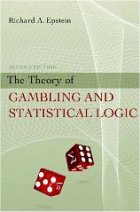 The Theory of Gambling and
Statistical Logic The Theory of Gambling and
Statistical Logic
by Richard Epstein
Richard Epstein's classic book on gambling and its mathematical
analysis covers the full range of games from penny matching, to blackjack and
other casino games, to the stock market (including Black-Scholes analysis). He
even considers what light statistical inference can shed on the study of
paranormal phenomena. Epstein is witty and insightful, a pleasure to dip into
and read and rewarding to study. The book is written at a fairly sophisticated
mathematical level, this is not- Gambling for Dummies- or 'how to beat the
odds' book, and an understanding of mathematics is essential to reading this
book.
"This classic book should be part of the library of everyone who
wants to better understand games and gambling. The treatment is unique,
original, and intriguing." - EDWARD O. THORPE, AUTHOR OF BEAT THE
DEALER
 Hardcover - 250 pages -
Academic Press; 2nd edition edition (13 Oct. 2012) £100.72 Hardcover - 250 pages -
Academic Press; 2nd edition edition (13 Oct. 2012) £100.72
Kindle - 465 pages -
Academic Press; 2 edition (28 Dec 2012)
£26.87
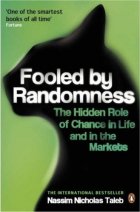 Fooled by Randomness: The Hidden Role of Chance in
Life and in the Markets Fooled by Randomness: The Hidden Role of Chance in
Life and in the Markets
by Nassim Nicholas Taleb
Everyone wants to succeed in life. But what causes
some of us to be more successful than others? Is it really down to skill and
strategy - or something altogether more unpredictable? This book is the
word-of-mouth sensation that will change the way you think about business and
the world. It is all about luck: more precisely, how we perceive luck in our
personal and professional experiences.
Nowhere is this more obvious
than in the markets - we hear an entrepreneur has 'vision' or a trader is
'talented', but all too often their performance is down to chance rather than
skill. It is only because we fail to understand probability that we continue to
believe events are non-random, finding reasons where none exist. This
irreverent bestseller has shattered the illusions of people around the world by
teaching them how to recognize randomness. Now it can do the same for you. .
 Paperback - 368 pages (3
May 2007) £6.54 Paperback - 368 pages (3
May 2007) £6.54
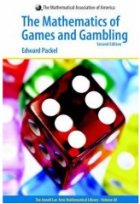 Mathematics of Games and Gambling Mathematics of Games and Gambling
by
Edward W. Packel
The new edition
of a favourite which introduces and develops some of the important and
beautiful elementary mathematics needed for rational analysis of various
gambling and game activities. Most of the standard casino games (roulette,
craps, blackjack, keno), some social games (backgammon, poker, bridge) and
various other activities (state lotteries, horse racing) are treated in ways
that bring out their mathematical aspects. The mathematics developed ranges
from the predictable concepts of probability, expectation, and binomial
coefficients to some less well-known ideas of elementary game theory.
The second edition includes new material on: Sports betting and the
mathematics behind it Game theory applied to bluffing in poker and related to
the 'Texas Holdem phenomenon' . The only formal mathematics background the
reader needs is some facility with school algebra.
Hardcover - 192 pages 2Rev Ed edition (Mar
2007) £23.75
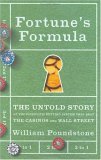 Fortune's Formula: The Untold Story of the
Scientific Betting System That Beat the Casinos and Wall Street Fortune's Formula: The Untold Story of the
Scientific Betting System That Beat the Casinos and Wall Street
by
William Poundstone
This is an
excellent book about the discovery of the Kelly formula that is unknown outside
gambling. This story has three protagonists. Two of them were scientists
working at Bell Labs: Claude Shannon, a genius polymath who developed
information theory; and John Kelly, a maverick genius, who is directly
responsible for the development of Kelly's formula. The third one is a
brilliant MIT mathematician, Ed Thorp.
As the author states, Ed Thorp's
genius consists in "...his continuous ability to discover new market
inefficiencies ... as old ones played out." Ed Thorp closed this second fund in
2002. He is now independently exploring inefficiencies in gambling.
Claude Shannon amassed large wealth by recording one of the best
investment records. His performance had little to do with Kelly's formula.
Between 1966 and 1986, his record beat even Warren Buffet (28% to 27%
respectively). Shannon strategy was similar to Buffet. Both their stock
portfolios were concentrated, and held for the long term. Shannon achieved his
record by holding mainly three stocks (Teledyne, Motorola, and HP). The
difference between the two was that Shannon invested in technology because he
understood it well, while Buffet did not.
John Kelly was a chain
smoking, gun collecting brilliant physicist. He died young at 41 of an
aneurysm. He worked closely with Shannon at Bell Labs. Besides being a
charismatic character the author does not write much about his life compared to
the other two.
Hardcover -
400 pages (September 14, 2005) £13.96
 Against the Gods: The Remarkable Story of
Risk Against the Gods: The Remarkable Story of
Risk
by Peter L. Bernstein
Bernstein has managed to take a subject which at first sight
seems intensely boring, and has made it fascinating. Whether or not you have
any interest in Risk, Statistics or Econimics, you owe it to yourself to read
this book. It is quite simply a "Ripping Yarn". Its greatness lies in
Bernstein's ability to tell the story in an accessible manner, without dumbing
down the essential facts. Let me say it again: Read this book because it is a
fascinating and well written story. The fact you will know a lot more about
Risk at the end of it is an incidental, but very welcome, extra.
 Paperback - 394
pages (9 October, 1998) expected price
£3.99 Buy
This Book Paperback - 394
pages (9 October, 1998) expected price
£3.99 Buy
This Book
 Taking Chances by John Haigh Taking Chances by John Haigh
What are the odds against winning the Lottery,
making money in a casino, or backing the right horse? Every day, people make
judgements on these matters and face other decisions that rest on their
understanding of probability: buying insurance, following medical advice,
carrying an umbrella. Yet many of us have a frightening ignorance of how
probability works. This text presents an entertaining and fascinating
exploration of probability, revealing traps and fallacies in the field. It
describes and analyses a variety of situations where chance plays a role,
including football pools, the Lottery, TV games, sport, cards, roulette, coins,
and dice. The book guides the reader round common pitfalls, demonstrates how to
make better informed decisions, and shows where the odds can be unexpectedly in
your favour.
 Paperback - 344
pages (May 2000) expected price
£7.19 Buy
This Book Paperback - 344
pages (May 2000) expected price
£7.19 Buy
This Book
 Getting the Best of It Getting the Best of It
by David
Sklansky
Getting the Best of It by
David Sklansky contains six sections discussing probability, poker, blackjack,
other casino games, sports betting, and general gambling concepts. This book
contains some of the most sophisticated gambling ideas that have ever been put
into print. Included is perhaps the best discussion of the basic mathematics of
gambling, yet it is written so that even the most non-mathematical of readers
can understand it. Many of the ideas discussed are those that the author
himself has successfully used during his career. Topics include expectation,
combinations, Baye's Theorem, the eight mistakes in poker, checking in the
dark, playing tight, The Key Card Concept, casinos and their mistakes, crapless
craps, betting sports, hedging and middling, knowing what's important, the Law
of Averages and other fallacies, and much more.
 Paperback - 310 pages (May 1997) expected price £18.88 Buy
This Book Paperback - 310 pages (May 1997) expected price £18.88 Buy
This Book
 Extra Stuff : Gambling Ramblings by Peter
Griffin Extra Stuff : Gambling Ramblings by Peter
Griffin
This book addresses many of
gambling's abstract concepts-proportional wagering, considerations for games
with variable pay-offs, the effects of rebates on losses-as well as more
mainstream subjects, such as the casino's treatment of hold percentages and
analyses of gambling systems. Although packed with mathematics, Griffin's easy
style accommodates most readers. Gamblers with all levels of experience will
have an enhanced understanding of the games.
This is a well-written book
about numbers, life, probability, humour, trading, and you-name-it, disguised
as a series of articles about gambling odds. If you are a gambler, you must
read this book.
 Paperback - 176
pages (July 1991) expected price
£7.53 Buy
This Book Paperback - 176
pages (July 1991) expected price
£7.53 Buy
This Book
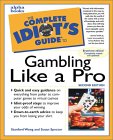 The
Complete Idiot's Guide to Gambling Like a Pro The
Complete Idiot's Guide to Gambling Like a Pro
by Standord Wong,
Susan Spector
From one of the most
respected writers, Wong. Some problems with US based games but most ideas
transferable to the UK and internet casinos. This guide explains the basics of
the major games of chance (such as slot machines and roulette), numbers games
(lottery and bingo), table games (poker and black jack), and picking a winner
(sport betting and horse racing).
Paperback - 432 pages 2nd Ed (30 June, 1999)
expected price £12.99 Buy
This Book  |